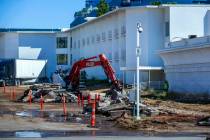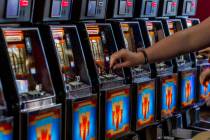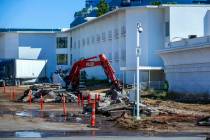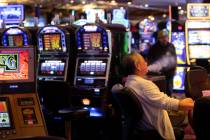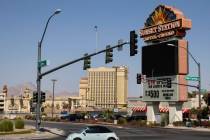Caesars’ quarterly net loss widens as customers spend less
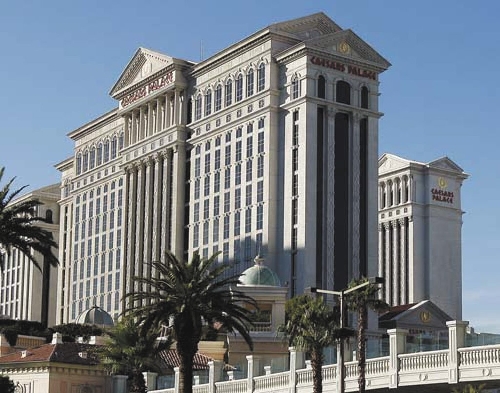

Caesars Entertainment Corp. widened its second quarter net loss as customers in Las Vegas spent less and the company’s Atlantic City casinos continued to be challenged by competition from within and from neighboring markets.
Despite a disappointing three months, Caesars touted its various expansion opportunities, including potential casinos in Maryland and Massachusetts, and the $500 million nongaming Project Linq development to open on the Strip in 2013.
Caesars Chairman Gary Loveman said the economy seemed to take a dip in the spring, which affected consumer spending and visitation at the company’s casinos throughout the U.S.
“The world since April and May has gotten more difficult and that’s reflected in my tone,” Loveman said in an analyst conference call after the earnings release for the quarter that ended June 30.
Caesars, which operates 10 casinos on or near the Strip, said it lost $241.7 million in the quarter, for a loss per share of $1.93. In the same quarter a year ago, Caesars lost $155.5 million, which was a net loss of $1.24 per share.
Revenue in the second quarter was up slightly, to $2.17 billion from $2.16 billion last year.
Analysts surveyed by FactSet Research had estimated the company would lose 82 cents a share in the quarter.
“After a strong first quarter, difficult economic conditions led to lower visitation in several regions, impacting our core operating results in the second quarter,” Loveman said. “While the economy may continue to pose challenges, we remain focused on controlling costs, investing in growth opportunities and our core brands and strengthening our capital structure.”
In Las Vegas, where the company operates such casinos as Caesars Palace, Harrah’s Las Vegas, the Rio, Planet Hollywood and Bally’s Las Vegas, Caesars said revenues fell less than 1 percent, which reflected increased hotel revenues but lower casino revenues due to reduced consumer spending.
In the Atlantic City region, which includes the company’s four Boardwalk-area casinos and the Harrah’s Philadelphia racetrack casino, the company saw revenues decline almost 9 percent.
Loveman told analysts the company has taken steps to reduce costs in Atlantic City, which has been challenged in recent years by casino expansion in the northeast and May’s opening of the Revel resort, the market’s first new casino since 2003.
“We have look at all matters of adjustments on Atlantic City,” Loveman said. “All the properties there have been under pressure. Staff reductions and other adjustments have been made to keep costs down.”
Caesars credited revenues from the company’s interactive gaming business, which includes online casinos operated in the United Kingdom, Italy and France, the World Series of Poker and the social media business Playtika, with offsetting losses from Las Vegas and Atlantic City. The division saw revenues increase 42 percent, to $56.8 million.
When an analyst asked Loveman about prospects for legal online poker in the U.S. this year, he held out little hope.
“You can’t legalize online gaming if Congress can’t act on anything,” he said.
Because of the inactivity in Congress, Loveman said Caesars has become more focused on legalization in Nevada, California, Delaware and other states.
KDP Investment Advisors gaming analyst Barbara Cappaert told investors Caesars’ second-quarter operating results weren’t surprising, but were larger than expected. The reduced figures from the company’s Strip casinos were in line with other casino operators.
Some of the declines are being offset by the company’s Horseshoe Casino Cleveland, Caesars said.
Cappaert said the biggest concern is the company’s industry-leading long-term debt of $19.9 billion.
“The story with Caesars remains leverage, leverage, leverage,” she said.
The company will use some of the $610 million it will receive from Penn National Gaming later this year for the sale of Harrah’s St. Louis to pay down debt.
“With the company’s stock trading just above its all-time low since the IPO, we see pressure to improve stock performance, too,” Cappaert said.
Shares of Caesars closed Monday at $8.47 on the Nasdaq Global Select, up 15 cent, or 1.80 percent.
Last week, Maryland gaming authorities gave Caesars approval for a $300 million Harrah’s Baltimore near the downtown waterfront. It will have 3,750 video lottery terminals.
The company hopes to learn by the end of 2013 if it will get a license to build a $1 billion hotel-casino in Boston.
Contact reporter Howard Stutz at hstutz@reviewjournal.com or 702-477-3871. Follow @howardstutz on Twitter.









